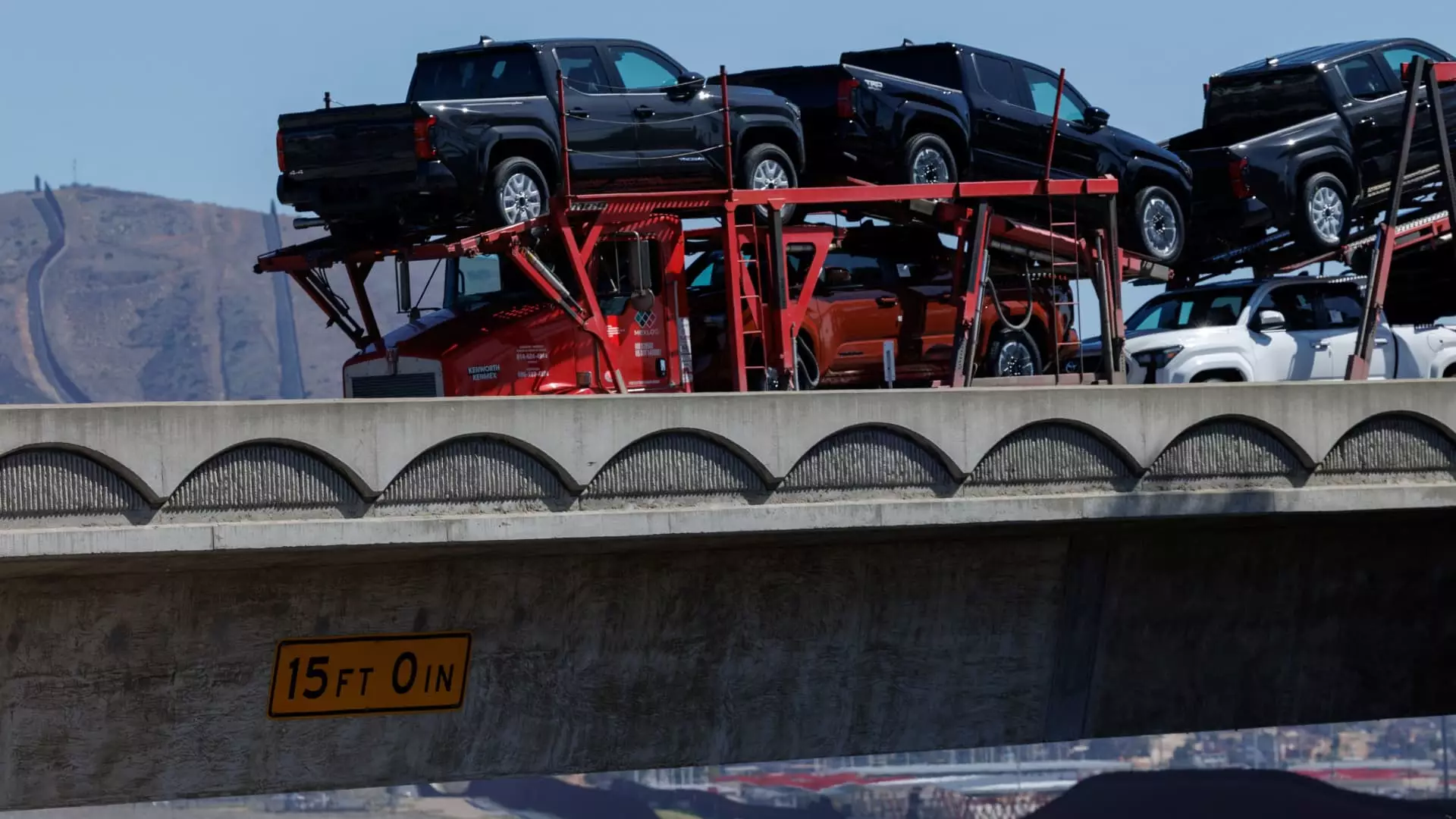The recent pronouncement by President Donald Trump regarding a hefty 25% tariff on all non-American manufactured vehicles is not merely a fiscal maneuver; it is a tectonic shift that threatens to destabilize the already vulnerable auto industry. While some may see this as a calculated effort to bolster U.S. manufacturing, the ramifications of such a policy are more complex than the President’s rhetoric suggests. As automotive stocks dive in response to the announcement—General Motors plummeting nearly 8%—it becomes starkly clear that the industry’s equilibrium could be dangerously shaken.
This decision, while cloaked in patriotic sentiments, mirrors a populist approach that tends to overlook the tangled web of global supply chains that modern manufacturing has woven. With the increasing globalization of the auto industry, this move serves as a reminder that protectionism could backfire, leading to increased prices for consumers and potential job losses rather than the promised job creation.
Protecting American Jobs: A Misguided Effort?
Supporters of the tariff argue that it will safeguard American jobs in the auto sector. However, this well-intentioned sentiment underestimates the reality of how many parts in American-made vehicles are sourced internationally. An average vehicle comprises roughly 20,000 components, and it’s a veritable logistical dance to assemble these parts all over the globe. The United Auto Workers union may cheer on this initiative, but the overarching impact could very well be counterproductive to the blue-collar workforce they aim to protect.
Rather than propelling local job creation, could it be that our workforce faces greater displacement as companies reevaluate their strategies to cope with inflated costs? A shift in manufacturing plants to more cost-efficient locales or a reduction in workforce could very well become a dark reality if these tariffs lead to increased vehicle prices, which analysts project could skyrocket by as much as $15,000 for imported vehicles.
Tesla: The Anomaly in a Turbulent Sea
Interestingly, amidst the turmoil, Tesla’s stock value rose nearly 5% as traditional auto giants falter. Unique positioning in the market combined with domestically focused production makes Tesla somewhat insulated from the brunt of these tariffs. But we must ask ourselves: should we herald Tesla’s profit as a success story or as a signal of impending market inefficiencies? Their rise amid falling competitors highlights a potentially dangerous bifurcation in the auto market, favoring companies that have strategically embraced innovation and domestic production.
In acknowledging Tesla’s presumed immunity, we must also contemplate whether Trump’s tariffs inadvertently serve as a further entrenchment of monopolistic practices—or worse, create a dependence on a singular brand, such as Tesla, fostering an auto ecosystem hollowed by diminished competition.
The Economic Paradox: Consumer Pain vs. Industry Gain
Goldman Sachs has warned that the imposition of such a hefty tariff could increase the price of domestic vehicles significantly. This paradox of trying to protect American interests while potentially hurting American consumers is where the argument for these tariffs falls short. A right-leaning perspective might laud the idea of prioritizing domestic manufacturing, but that shouldn’t come at the direct expense of consumer welfare. An increase of several thousand dollars in vehicle prices could push working-class families out of the car market altogether, destabilizing the foundations of local economies reliant on auto sales.
With an average of 50% of a U.S.-made car’s components derived from foreign sources, the impending inflation is not just a number; it deeply affects Americans’ quality of life and purchasing power. The political rhetoric surrounding job preservation loses its potency when weighed against the tangible financial strain on everyday citizens.
What’s Next? The Road Ahead for the Auto Industry
As we stand at this crossroads, one must ponder the future trajectory of the auto industry under these tariffs. While Trump has indicated that exceptions could apply under the United States-Mexico-Canada Agreement, uncertainty remains regarding implementation and compliance. If the tariffs influence the behaviors of major auto manufacturers in ways that lead to inflation, supply chain disruptions, or job losses, it is not merely a failure of policy but also a deep betrayal of the workers these measures purport to protect.
Those in the center-right liberal sphere would argue for a more balanced approach—an initiative that empowers American manufacturing without compromising consumer affordability. It’s crucial to avoid falling into the trap of protectionism driven by populist sentiments and instead pursue policies that foster sustainable growth for both manufacturers and consumers alike. It is time to rethink protectionist strategies in an increasingly interconnected world, or risk losing sight of the very ideals of economic liberty and choice that our market thrives upon.

